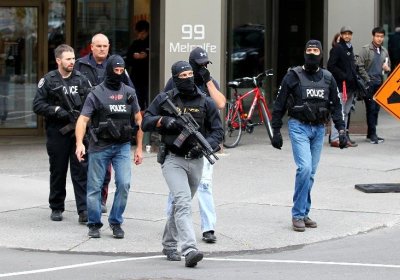The London School of Economics (LSE) was occupied by students on March 17. The occupation, still going as of March 28, has since spread to King's College London, University of Arts London and Goldsmiths University of London.
More than 100 students took over the school, which has been associated with neoliberal economic theory for decades, and declared that the central university administration building has been transformed into the Free University of London.
Canada
Trans Canada Pipelines announced on December 2 it would stop work on building an oilshipping terminal on the St Lawrence River at Cacouna, Quebec.
The immediate reason is that the project will threaten the beluga whale population in the river. Another, unreported, reason is that a broad citizens’ movement in Quebec fiercely opposes the project.
The Vancouver Sun published a description on October 24 of the troubled man who killed a guard in Ottawa two days before and then entered Canada’s parliament building carrying his gun. The 32-year-old man, Michael Zehaf-Bibeau, was shot and killed by police.
The Sun reporters spoke to people who knew Zehaf-Bibeau while he lived in Vancouver during recent years. They described an angry and troubled man grappling with mental illness and drug addiction.
A deranged gunman, Michael Zehab-Bibeau, shot dead a soldier at the Canadian war memorial in Ottawa before being shot dead while trying to storm parliament on October 22. The motive for the actions, if there was a clear one, remains unknown.
The attack came two days after two Canadian soldiers were hit by a car in Quebec. The car was driven by Martin Couture-Rouleau, a 25-year-old Canadian who had recently converted to Islam. One of the soldiers died, as did Couture-Rouleau when he was shot by police upon apprehension after allegedly brandishing a large knife.
St Louis officer shoots unarmed Black teen ― yes, again
“Angry protests erupted again in St. Louis on Wednesday night after an 18-year-old man was shot and killed by an off-duty police officer ― reigniting tensions in a city still reeling from the killing of Mike Brown in nearby Ferguson in August …
Confronting Injustice: Social Activism in the Age of Individualism
Umair Muhammad
www.confrontinginjustice.com
Too many supposedly radical books are written by academics for academics, apparently competing to see who can produce the most incomprehensible prose.
My list of “books to be reviewed” contains literally dozens of overstuffed and overpriced volumes that only a handful of specialists will ever read, and with little relevance to the non-university world.
In 2012, Quebec’s student movement carried out a months-long strike, managing to push back and hold off a neoliberal government’s bid to raise tuition fees.
Repeatedly mobilising upwards of 200,000 people at monthly “mega-manifs”, the “Maple Spring” was an all-too rare win against the forces of austerity, and so it captured imaginations around the world.
Revolutionary Activism in the 1950s & '60s Volumes I
By Ernest Tate
Resistance Books, 2014
www.resistancebooks.org
“A police cruiser with two uniformed officers pulled up alongside me,” recalls Ernest Tate in his newly published memoir Revolutionary Activism.
“They jumped out and asked me for identification. I gave it to them. ‘What’s in your suitcase?’ Dirty underwear, I said. ‘Open it,” they ordered. I told them it was none of their business. They almost went berserk …”
A rupture of the TransCanada PipeLines (TCPL) gas line occurred in the middle of the night on January 25 near the village of Otterburne. A huge fireball erupted into the night sky and burned for many hours.
The explosion tore a large crater in the ground. Several thousand homes in 10 small communities were left without gas heating during temperatures that dipped to minus 30C. It took days for full service to be restored.
The pipeline brings gas from Alberta to the US across the Manitoba-Minnesota international border. It feeds parts of southern Manitoba along the way.
The irony of fracking is that it destroys the natural resource it needs most.
The tragedy for those living near fracking operations is that natural resource is the fresh ― and increasingly scarce ― water supply on which they, too, depend.
Fracking ― or hydraulic fracturing ― is the fracturing or rock by pressurised liquid. It is used to access several natural resources, such as shale gas and coal seam gas, in otherwise out-of-reach places.
“Bangladesh is a world leader in adaptation to natural disasters,” Bangladeshi community organiser Nasima Akter told a Toronto audience January 8. “But now climate change threatens to wash away all our gains.”
Akter had been invited by East End Against Line 9, a neighbourhood committee formed to protest against a proposed cross-Toronto tar-sands pipeline. The East End committee wanted to learn about the implications of Canada’s reckless tar-sands development for a poor and vulnerable nation.
Workers across the U.S., Canada, and Mexico united in an Inter-Continental Day of Action on January 31 to stop a massive new trade agreement, the Trans-Pacific Partnership — commonly referred to as “NAFTA on steroids.”
In the U.S., the immediate fight is to block a bill that would grant the president “fast track” authority to sign off on the TPP. Defeating fast track would likely stop the TPP.
Fast track is designed to swiftly pass trade deals, circumventing the standard Congressional procedures of hearings, debates, and resolutions.
- Previous page
- Page 9
- Next page








